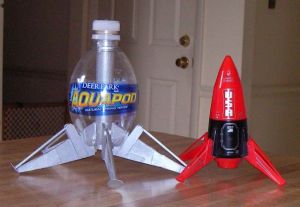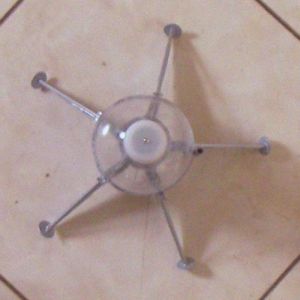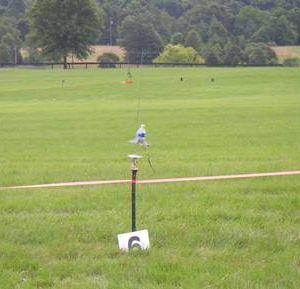Scratch Aqua-Lander Original Design / Scratch Built
Scratch - Aqua-Lander {Scratch}
Contributed by Dick Stafford
| Manufacturer: | Scratch |
Brief: Construction:
This is a "lander" style rocket built from an Aquapod water bottle. Aquapods are stubby, bulbous bottles whose shape is self-described as orbastic. The first known use in rocketry is an incarnation of the Holy Hand Grenade of Antioch. When I saw one at a launch, I just had to get a package of them (they come in packs of 8 and are stashed amongst the large cases of regular shaped and sized water bottles).
The following are the materials used in the original construction:
- The legs are a conglomeration of scrap basswood, popsicle sticks, bamboo skewers, and circular pieces of cardboard (found, not made)
- The center tube is BT-20
- The "cone" includes the cap, the nozzle end of an 18mm motor, a small bolt to center these components, and a loop of elastic.
- Miscellaneous parts include a cardboard sleeve slipped into the bottle's neck, a sliver of a 24mm motor on the bottom of the motor tube, an 18mm motor block, a short piece of Kevlar twine tied around the block, and a piece of an AT Copperhead tube as the launch lug.
I prepped the bottle by "Dremelling" a BT-20 sized hole in the base and slotting the bottle to accommodate through the wall fins. In fact, the fin/motor tube unit just slips in and is removable. There are 5 fins mounted between the protrusions on the bottom of the bottle. I also ground the threads off the neck of the bottle. No grinding was required inside the neck as the I happened to have a cardboard sleeve that fit snugly in the hole and over the BT-20. You could improvise with various items including a spent 24mm casing.
 I used a piece of a 24mm case on the base of the motor tube and installed a standard motor block. The legs are made from scrap basswood. It was so "scrap" that the legs are actually two pieces just so I could squeak out all 5 legs. They are joined with some overlapping cardstock. You should be able to spot the popsicle sticks and bamboo skewers in the photos.
I used a piece of a 24mm case on the base of the motor tube and installed a standard motor block. The legs are made from scrap basswood. It was so "scrap" that the legs are actually two pieces just so I could squeak out all 5 legs. They are joined with some overlapping cardstock. You should be able to spot the popsicle sticks and bamboo skewers in the photos.
This describes version 1. Later you will see why some rework was required. In version 2, I added a motor hook and mounted some Kevlar twine through the wall of the motor tube. Since this is internal, it is hardly visible. I also replaced the lost cap and added a streamer made from yellow caution tape.
Finishing:
I did not finish this rocket.
Flight and Recovery:
In each of two flights, the B6-4 motor was friction fit. (As it turned out, this didn't work out so well.) I loaded the end of the motor and a couple of BT diameters with dog barf and used a small (maybe 8") plastic chute left over from my Model Minutes G-200 Carrier. This was a tight fit but I got it in.
 The boost on this motor was great. It went perfectly straight and was reasonably quick, however, on flight one the chute didn't come out and the lander lawndarted. It only lost one circular pad, and was ready for...
The boost on this motor was great. It went perfectly straight and was reasonably quick, however, on flight one the chute didn't come out and the lander lawndarted. It only lost one circular pad, and was ready for...
Flight 2 resulted in a separation and the nose cap was lost. I alluded to the rebuild above, but the streamer version has not flown yet. Hopefully the motor hook will help also.
Summary:
This is a unique looking rocket that gets noticed by the RSO and spectators alike. Being so stubby, it flies well with no added weight. The one issue is there isn't much room for a recovery system. A 13mm motor version should also fly well under A10 power.
 |
 |